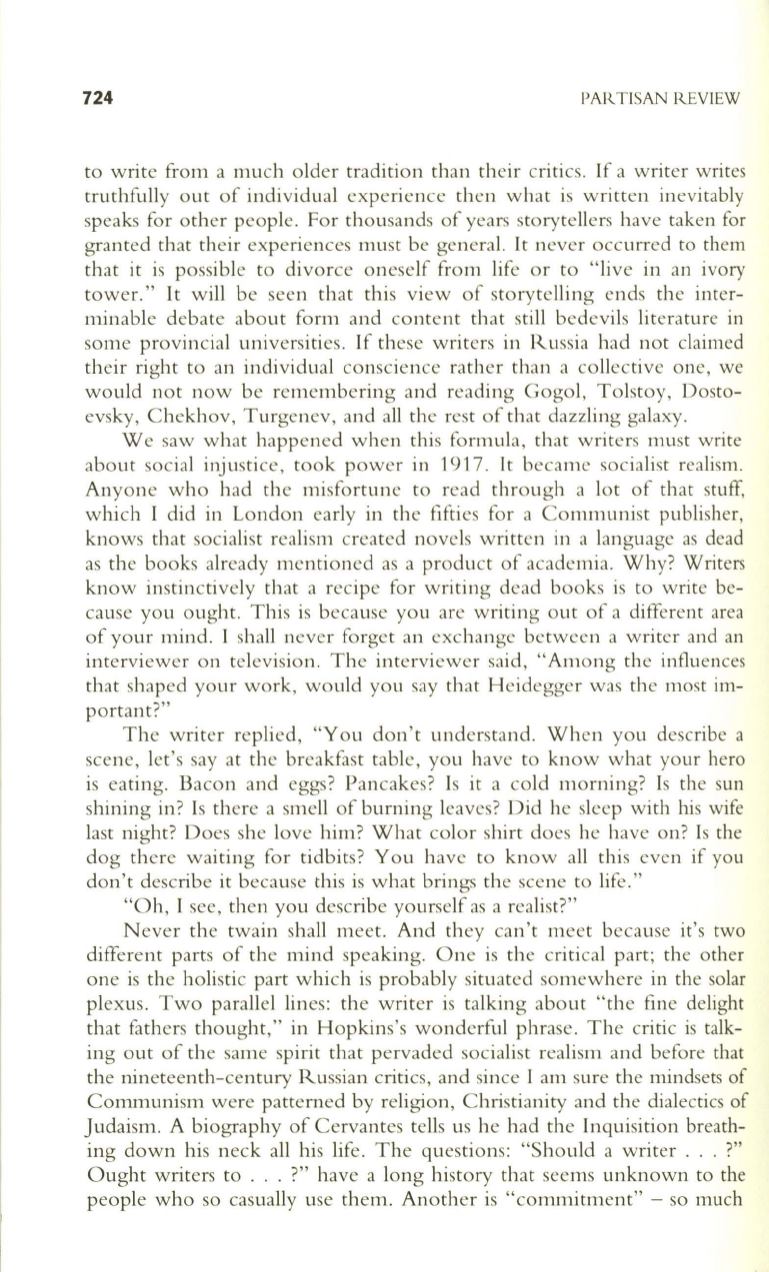
724
PARTISAN REVIEW
to write from a much older tradition than their critics. If a writer writes
truthfully out of individual experience then what is written inevitably
speaks for other people. For thousands of years storytellers have taken for
granted that their experiences must be general. It never occurred
to
them
that it is possible to divorce oneself from life or to "live in an ivory
tower." It will be seen that this view of storytelling ends the inter–
lninable debate about form and content that still bedevils literature in
some provincial universities. If these writers in Russia had not claimed
their right to an individual conscience rather than a collective one, we
would not now be remembering and reading Gogol, Tolstoy, Dosto–
evsky, Chekhov, Turgenev, and all the rest of that dazzling galaxy.
We saw what happened when this formula , that writers must write
about social injustice , took power in 1917. It became socialist realism.
Anyone who had the misfortune to read through a lot of that stuff,
which I did in London early in the fifties for a Communist publisher,
knows that socialist realism created novels written in a language as dead
as the books already mentioned as a product of academia. Why? Writers
know instinctively that a recipe for writing dead books is to write be–
cause you ought. This is because you are writing out of a different area
of your mind. I shall never forget an exchange between a writer and an
interviewer on television . The interviewer said, "Among the influences
that shaped your work, would you say that Heidegger was the most im–
portant?"
The writer replied, "You don't understand . When you describe a
scene, let's say at the breakfast table, you have to know what your hero
is eating. Bacon and eggs? Pancakes? Is it a cold morning? Is the sun
shining in? Is there a smell of burning leaves? Did he sleep with his wife
last night? Does she love him? What color shirt does he have on? Is the
dog there waiting for tidbits? You have to know all this even if you
don't describe it because this is what brings the scene to life. "
"Oh, I see, then you describe yourself as a realist?"
Never the twain shall meet. And they can't meet because it's two
different parts of the mind speaking. One is the critical part; the other
one is the holistic part which is probably situated somewhere in the solar
plexus. Two parallel lines: the writer is talking about "the fine delight
that fathers thought," in Hopkins's wonderful phrase. The critic is talk–
ing out of the same spirit that pervaded socialist realism and before that
the nineteenth-century Russian critics, and since I am sure the mindsets of
Communism were patterned by religion , Christianity and the dialectics of
Judaism. A biography of Cervantes tells us he had the Inquisition breath–
ing down his neck all his life. The questions : "Should a writer ... ?"
Ought writers to ... ?" have a long history that seems unknown to the
people who so casually use them. Another is "comn,itment" - so much


